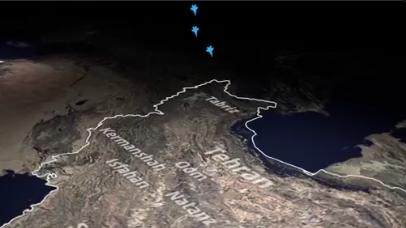Israel Targets Iran’s Quds Force in Tehran, Escalating Fierce Conflict with Heavy Casualties
In a dramatic escalation, Israel targeted the IRGC Quds Force command center in Tehran, killing senior officials and intensifying a conflict that has already left hundreds dead across both countries. As missile barrages continue and civilian areas are hit, fears of regional war grow.

In a dramatic escalation of hostilities, Israel conducted a strike on Monday targeting the command center of Iran’s Quds Force, a key unit of the Revolutionary Guards that coordinates support for Iranian allies across the Middle East and reports directly to Iran’s Supreme Leader. The Israeli military’s attack on the Quds facility in Tehran marks a significant intensification of the ongoing conflict, though the extent of damage to the facility could not be independently verified. This strike follows a series of Israeli attacks on Iran that began on Friday, sparking some of the fiercest and most prolonged exchanges in the decades-long enmity between the two nations.
According to Iran’s health ministry, Israeli strikes have killed at least 224 people and injured over 1,400 in Iran since Friday. In Israel, retaliatory Iranian missile barrages have claimed at least 23 civilian lives. The violence has raised global concerns about a wider war that could draw in the United States and other powers, with no immediate signs of de-escalation from either side.
On Monday, the Israeli military continued targeting missile sites in central Iran while urging its citizens to remain near shelters. Hours later, sirens blared across Israel as Iran launched a salvo of missiles.
The Israeli police reported strikes in two communities in the Tel Aviv district, and in Petah Tikva, a central Israeli city, a missile hit an apartment building, killing at least four people, including a couple in a safe room, according to local officials. Doron Kadosh reported that the Home Front Command emphasized the critical role of safe rooms, noting that while they are designed to withstand blast and shrapnel, they are vulnerable to direct hits from half-ton missiles. In Petah Tikva, those in adjacent safe rooms survived unharmed, but two others outside safe rooms were killed. A senior officer highlighted that in Bat Yam, despite severe destruction, 180 people survived in safe rooms, underscoring their life-saving importance.
The conflict has disrupted life in both nations. In Tehran, a rare Israeli daytime assault on Sunday afternoon caused widespread panic, with packed roads, long lines at gas stations, and residents fleeing with suitcases, according to Iran’s traffic police chief and state media. In Israel, communities like Pisgat Ze’ev face challenges due to the lack of safe rooms, forcing residents to travel to shelters, a risky endeavor for the elderly and disabled, as noted by Avi Rabina. The Beit Shemesh municipality urged residents to conduct daily headcounts via WhatsApp groups to aid rescue efforts, emphasizing that such measures could be critical for emergency responders following missile strikes.
Israel’s strikes have expanded beyond nuclear sites, air defenses, and military targets to include Iran’s energy sector, a cornerstone of its economy. The Israeli military’s chief spokesman claimed “freedom of action” in Tehran’s skies, though some Iranian air defenses remain operational, per an anonymous Israeli defense official. Nitzan Shapira reported that the IDF confirmed the elimination of four senior Iranian intelligence officials, including the head of the Revolutionary Guards’ intelligence organization, echoing Israel’s strategy last fall against Hezbollah, where it decimated the group’s leadership and arsenal.
The conflict has also derailed diplomacy. Scheduled U.S.-Iran talks on Iran’s nuclear program in Oman were canceled on Sunday. Iran’s Foreign Minister Abbas Araghchi reiterated to diplomats in Tehran that Iran is open to agreements ensuring it does not pursue nuclear weapons but insists on maintaining uranium enrichment for civilian purposes.
As both nations brace for further escalation, the human toll and fears of a broader regional war continue to mount.